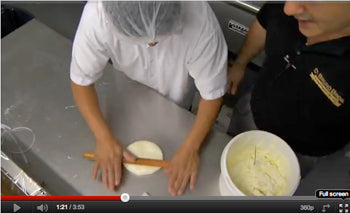
She moved so easily, All I could think of was sunlight.” -Paul Simon, “I Know What I Know”
With the possible exception of Cheddar, no cheese is as misunderstood as Gouda. Nascent cheese enthusiasts are encumbered with the misconception that Gouda is some lesser form of cheese, one that either comes smoked or “regular.” This perception of commodity has hampered Gouda’s reputation in America, but the reality is that the nation’s best cheese shops offer Goudas that rival the best cheeses in the world.
My current favorite is Wilde Weide. On a recent trip to Holland, I was able to visit the producers of this cheese, a husband and wife team named Jan and Roos (pronounced Rose). Jan and Roos live on a tiny island in South Holland, a speck amidst a series of meandering canals and lakes. The name Wilde Weide means “Wild Meadows,” a reference to their bucolic land that is lush with grasses, flowers and herbs. Jan’s Montbeliard and Friesen cattle feed on this bountiful landscape, and their diet shines through in the milk.

Unlike the majority of aged Goudas, which are caramely, nutty and distinctly sweet, Wilde Weide tastes bright. The first time I tasted it, grapefruit was the flavor that stuck in my head, but subsequent samplings have shown grassy, herbal tones. Like its counterparts, there is some sweetness, but it is that of fresh cream, not butterscotch. Overall, it is clean and vibrant with a distinct but subtle acidity. It tastes like sunlight.
Like all farmstead cheese, Wilde Weide can be served with a simple variety of rustic accoutrements: crusty bread, roasted nuts, cured meat and chutney. Personally, I think it is incompatible with wine, but a good wheat beer or pilsner should do the job nicely.

A quick note of warning: the entire United States received eight wheels a month, of which Di Bruno Brothers always receives one (and if we are lucky, two). Jan and Roos can only make so much with their tiny herd of cattle, so supply is understandably limited. Always ask your monger if there is any in stock, or ask them to call you the next time it comes in.






